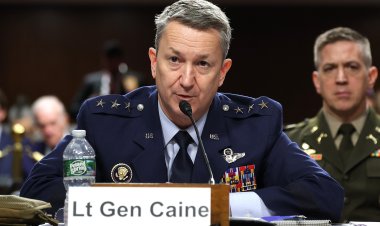Biden gives clearest indication to date he’s willing to make a critical debt ceiling compromise
The president downplayed his embrace of work requirements on government programs as modest. But his fellow Dems have already warned against it.

President Joe Biden on Wednesday left the door open to expanding some work requirements as part of a debt ceiling deal, committing only to opposing new restrictions that affect health care programs.
“I’m not going to accept any work requirements that’s going to impact on medical health needs of people,” he said, before adding that “it’s possible” a deal could expand work rules for other federal programs.
Biden downplayed the significance of adding more work requirements, insisting that any new measures would not be “anything of consequence.” But it prompted immediate backlash within his own party, where Democrats bristled at the prospect of backing harsher restrictions for low-income Americans.
"It was confusing because he said that he wasn't open to much more than what we had, which seemed to leave a little door open," said Rep. Pramila Jayapal (D-Wash.), who chairs the Congressional Progressive Caucus. "But look, I have been clear: That is a nonstarter with us."
Biden's willingness to speak openly about support for modest measures that Democrats traditionally oppose signals that negotiations are narrowing in on specific policies and that the White House is comfortable with some concessions.
The White House has consistently dismissed the prospect of new restrictions on Medicaid, and it warned it would fight against any ideas that pushed people into poverty. Still, Biden has been coy about expanding work requirements for other safety net programs like food aid and cash assistance. Democrats in recent days also internally floated the potential for new restrictions to the emergency aid program known as Temporary Assistance for Needy Families, POLITICO first reported earlier this week.
Biden's posture further heightened concerns among Democratic lawmakers and progressives groups that Biden will give in to GOP demands for stricter work rules — an area that many House Republicans had privately indicated was a red line for them.
Earlier on Wednesday morning, top House Democrat Hakeem Jeffries dismissed Republicans’ work requirement proposals as “entirely unreasonable.”
The Congressional Black Caucus also planned to discuss Biden's remarks during a meeting Wednesday, as it weighs taking a stronger public stance against the prospect of additional work requirements, a caucus official said.
"We have made clear to House leadership that work requirements are not something the CBC would support," said the official, who was granted anonymity to characterize private conversations. "That is not a new position."
Biden first suggested he'd be willing to consider GOP work requirement proposals Sunday, in remarks that two people familiar with the matter described as off-the-cuff and which prompted a scramble to tamp down backlash among Democratic allies.
The White House subsequently put out statements indicating Biden would oppose any measures that had the potential to increase poverty, and on Monday night said Republicans' ideas did just that.
"Republicans couldn't pass them into law when they had unified control of government — and the president is fighting to ensure they will not be in a bipartisan budget agreement," White House spokesperson Michael Kikukawa said.
But Biden has now appeared to soften his stance. His vague indication that any concessions would not "go much beyond" the current law did little to reassure progressive groups tracking the talks.
"We do not believe the president should be considering any sort of work requirements as part of a deal to lift the debt ceiling, and we will oppose any deal that includes them," said Maurice Mitchell, national director for the progressive Working Families Party.
Biden’s remarks came ahead of his departure for the G-7 summit in Japan, where he’ll spend the rest of the week before coming back Sunday. The president in the meantime designated three top aides to continue debt ceiling negotiations, saying he would keep in constant contact with them throughout the trip and plans to hold a press conference upon his return.
“I’m confident that we’ll get the agreement on the budget and America will not default,” Biden said, later emphasizing that he still considers this a negotiation over the budget, and not the debt ceiling. “We’re going to come together because there’s no alternative.”
Office of Management and Budget director Shalanda Young, top Biden adviser Steve Ricchetti and Office of Legislative Affairs chief Louisa Terrell will take up the negotiations on behalf of the White House.
"We narrowed the group to meet and hammer out our differences," Biden said, adding that the three have the authority to make agreements on his behalf.
Biden originally planned to travel to Papua New Guinea and Australia after the G-7, but cut the trip short so that he could resume in-person meetings on the debt ceiling. The Treasury Department has warned that the U.S. will be unable to pay its bills as soon as June 1 without an increase to the borrowing limit. House Speaker Kevin McCarthy previously suggested that the two sides needed to clinch a deal by the end of this week to ensure Congress could pass the legislation before the deadline.
Meredith Lee Hill contributed to this report.












